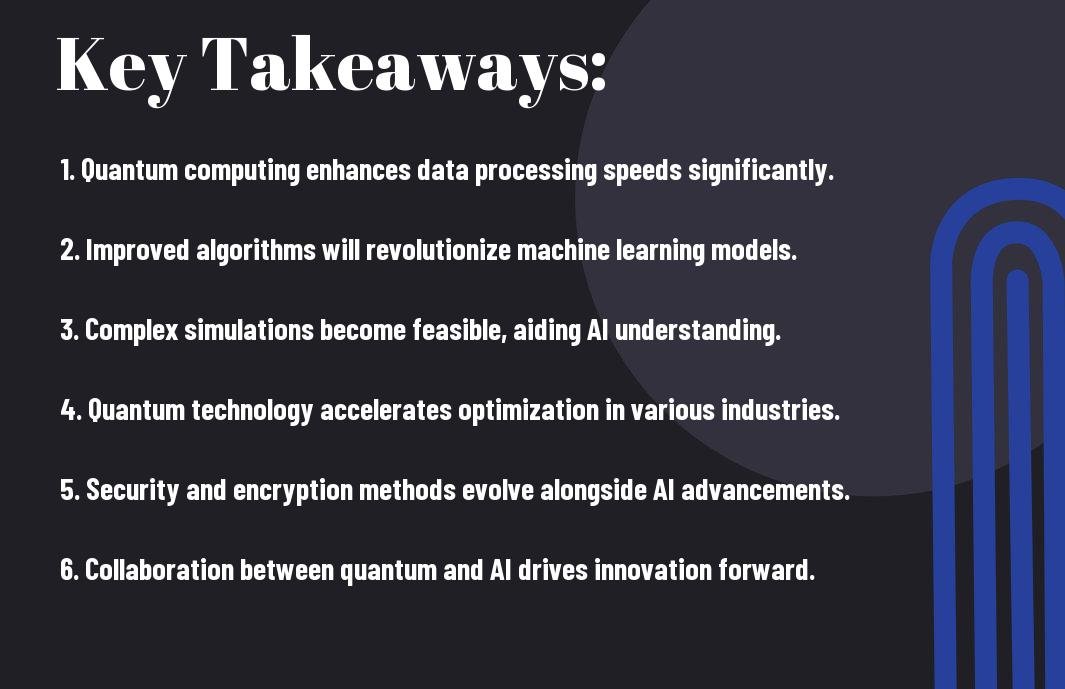Most experts agree that quantum computing will significantly transform the landscape of artificial intelligence by 2025. As you explore into this discussion, you’ll discover how the unique processing abilities of quantum systems could enhance machine learning algorithms, accelerate data analysis, and improve problem-solving capabilities in ways previously unimaginable. Understanding the interplay between these two groundbreaking technologies will equip you with insights into the future of AI and its potential to reshape numerous industries. Get ready to explore how this revolutionary partnership may redefine innovation in the years to come.

Understanding Quantum Computing
For those looking to grasp quantum computing, it’s fundamental to recognize its revolutionary potential. Quantum computing leverages the principles of quantum mechanics to perform calculations at speeds unattainable by traditional computers. This technology operates on quantum bits, or qubits, which can exist in multiple states simultaneously, offering unprecedented computational power. Understanding this shift is vital as it intertwines with the future of artificial intelligence.
Definition and Principles
Understanding quantum computing begins with its basic definitions and underlying principles. It diverges from classical computing by utilizing qubits that can represent both 0s and 1s at the same time, thanks to quantum superposition. Additionally, the phenomenon of entanglement allows qubits to be interconnected, leading to faster processing and complex problem-solving capabilities that can greatly benefit AI systems.
Current State of Quantum Technology
On the frontlines of technology, quantum computing is making significant strides, but it remains in a nascent stage. Various companies, research institutions, and governments are investing heavily in developing functional quantum systems. While practical applications are still emerging, the groundwork is being laid for more advanced developments that could fundamentally alter how you engage with artificial intelligence in the near future.
In fact, notable tech giants like IBM, Google, and Microsoft have made substantial progress in building quantum processors and developing quantum algorithms. Startups are also surfacing, pushing the boundaries of quantum software and applications. These advancements create a competitive landscape that not only fuels innovation but also elevates your expectations for AI capabilities. While fully operational quantum computers are not yet commonplace, the pace of development suggests that the technology will play a pivotal role in shaping AI’s future as you move toward 2025.

AI’s Evolution: Current Trends
Now, you can see that AI is rapidly transforming various sectors, from healthcare to finance. Currently, machine learning algorithms and deep learning techniques lead advancements, allowing organizations to process vast amounts of data efficiently. As AI systems become more sophisticated, they improve decision-making, automation, and personalized experiences, indicating a strong trajectory toward greater integration in daily life.
Overview of AI Development
Beside the impressive capabilities and applications of AI today, its development has evolved significantly over the years. You may observe how improvisations in processing power and data availability have led to more robust algorithms, boosting AI’s efficacy in various tasks. This evolution suggests a promising future, where AI continues to adapt and grow.
Challenges Facing AI Growth
Against this backdrop of rapid development, you must also recognize the challenges hindering AI growth. Issues like data privacy, ethical concerns, and potential job displacement raise significant questions as AI becomes more embedded in your life.
In addition to the aforementioned challenges, scalability and interoperability pose substantial hurdles. You might find that as AI systems diversify, ensuring compatibility between various platforms and software can be complicated. Moreover, your concerns about biased algorithms resulting from skewed data sets can diminish trust in AI systems. Addressing these challenges is necessary for fostering advancements that align with societal values and improve the overall AI experience.
The Intersection of Quantum Computing and AI
After exploring the cutting-edge developments in quantum computing, you will find exciting intersections with AI that shape its future. These technologies will work synergistically, as highlighted in 10 ways AI, quantum and trust will shape the year ahead. Their integration promises enhanced algorithms and accelerated data processing, which could lead to unprecedented advancements in numerous fields.
Enhanced Computational Power
At the core of quantum computing lies its unparalleled computational power, which could greatly enhance your AI applications. This power stems from quantum bits, or qubits, allowing for simultaneous processing of complex calculations that traditional systems struggle to perform. This leap in performance translates directly to faster and more accurate AI solutions.
Potential Applications in Machine Learning
With quantum computing, the landscape of machine learning expands dramatically. You will soon leverage this power to process vast datasets more efficiently, leading to more precise models and insights. Quantum algorithms will refine and accelerate tasks like clustering, classification, and predictive analytics, reshaping how you approach machine learning challenges.
Due to quantum computing’s ability to analyze immense volumes of data in parallel, you can expect machine learning to evolve significantly. This evolution will allow for real-time processing and more accurate predictions, facilitating advancements in industries such as healthcare, finance, and transportation. As your organization adopts these tools, the potential for innovation and improved decision-making will increase, impacting your strategies and operations positively.

Predictions for Quantum Computing in AI by 2025
All indications suggest that by 2025, quantum computing will significantly enhance AI capabilities, particularly in processing vast datasets. This technology will propel advancements in various fields, including healthcare. For instance, you can read about how quantum computing will affect artificial intelligence applications in healthcare, emphasizing its potential to revolutionize diagnostics and treatment planning.
Potential Breakthroughs and Innovations
With the integration of quantum computing, you can expect groundbreaking innovations in machine learning algorithms, enabling AI to learn and adapt in ways currently unattainable. This could lead to smarter decision-making tools and enhanced predictive analytics, reshaping your approach to complex problem-solving.
Industry Impacts and Transformations
Breakthroughs in quantum computing will lead to transformative impacts across various industries, including finance, logistics, and pharmaceuticals. As quantum-enhanced AI tools emerge, you will experience faster data analysis, superior risk assessment, and more efficient supply chain management, redefining your business operations.
Predictions highlight that the finance sector could particularly benefit as quantum computing facilitates near-instantaneous calculations for high-frequency trading and risk management. Similarly, you may see healthcare transformations, such as accelerated drug discovery processes. As quantum AI tools evolve, your industry may witness a significant shift toward data-driven strategies and enhanced competitive advantage, allowing for more informed decision-making processes.
Ethical Considerations and Challenges
Despite the promising advancements in quantum computing and AI, ethical considerations must remain at the forefront of these technological developments. As you explore the implications of quantum computing, consider the potential for biases in algorithms, the impact on job displacement, and the overarching responsibility of ensuring equitable access to these innovations. Addressing these ethical challenges is imperative for fostering trust and transparency in AI’s evolving landscape.
Data Security Concerns
About the security of data in a quantum computing landscape, you should be aware that quantum algorithms could break current encryption methods, potentially exposing sensitive information. As AI systems increasingly rely on vast amounts of data, the vulnerability to data breaches will intensify. Consequently, it is imperative for you to remain informed about the strategies in place to safeguard your data in light of these emerging technologies.
Compliance and Regulatory Issues
Compliance with existing laws and regulations will be a significant challenge as quantum computing and AI converge. As you navigate this landscape, it is critical to stay updated on how both fields intersect with legal frameworks that govern data protection, privacy, and ethical standards. Adapting to rapid technological advancements will require diligence and proactive measures to ensure adherence to these evolving guidelines.
In addition to the need for compliance, you should consider that regulatory bodies are likely to play a vital role in shaping the policies surrounding quantum computing and AI integration. As new technologies emerge, regulations may need to be reexamined or created to address their unique characteristics. Staying informed of such changes will empower you to adapt your use of AI responsibly while embracing the opportunities that quantum computing brings. Engaging with policymakers and industry leaders will be imperative for ensuring that your voice is heard in shaping the framework governing these powerful technologies.
Future Prospects Beyond 2025
Unlike today, the intersection of quantum computing and AI will revolutionize several industries beyond 2025. With advancements in computational power, you’ll see unprecedented capabilities in data analysis, pattern recognition, and predictive modeling. This fusion will enable applications that previously seemed unattainable, leading to smarter systems with far-reaching implications across various sectors, enhancing everything from healthcare to finance.
Long-Term Implications for AI and Quantum Computing
Among the long-term implications of AI integrated with quantum computing is the potential for breakthroughs in machine learning algorithms. You may find that these algorithms can evolve at a pace previously unnoticed, resulting in models that are more accurate, efficient, and capable of solving complex problems that currently perplex traditional computing systems.
Emerging Technologies to Watch
Across the technological landscape, emerging innovations are poised to complement the synergy between quantum computing and AI. As you navigate these advancements, pay attention to developments in quantum algorithms, neuromorphic computing, and advancements in quantum-safe cryptography, as these will anchor the future of secure and efficient machine learning systems.
This synergy of emerging technologies aims to enhance functionality and security in AI applications. You can expect neuromorphic computing to enable AI systems to mimic human brain processes, while quantum algorithms will optimize problem-solving capacities. Furthermore, quantum-safe cryptography will work to secure sensitive AI data, making these technologies indispensable as they unfold alongside each other in the coming years.
To wrap up
Conclusively, by 2025, you can expect quantum computing to significantly enhance AI’s capabilities, dramatically improving the speed and efficiency of data processing. This evolution will enable you to tackle complex problems in areas such as drug discovery, climate modeling, and personalized medicine with unprecedented accuracy. As quantum advancements integrate with AI, your understanding will deepen, allowing for innovative solutions that were once out of reach. Embracing these changes will be imperative for you to remain at the forefront of technological advancements in your field.









